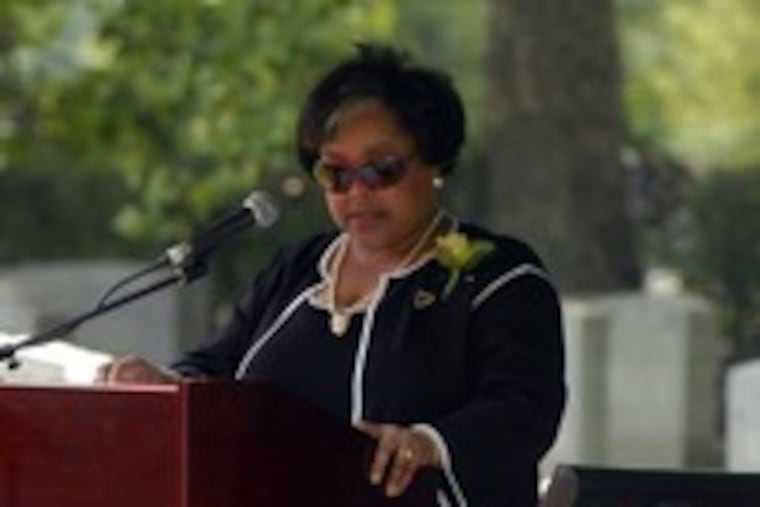Annette John-Hall: AKA marks its 100th
Sometimes, forward-thinkers are so far ahead of everyone else that they don't always get to see the richest fruits of their vision.

Sometimes, forward-thinkers are so far ahead of everyone else that they don't always get to see the richest fruits of their vision.
Ethel Hedgeman Lyle is one of them.
You have to wonder what Mrs. Lyle would think of the little community service/social club she and eight others created for like-minded students on the campus of Howard University a century ago.
Surely she couldn't have imagined that her little idea for a sorority in 1908 would be the first, and grow into the largest, black sorority in the world, with 200,000 members in 975 chapters who have given away millions of dollars in scholarships and for community projects.
More than 20,000 of its members are gathered at the Centennial Convention in Washington this week, attending gala dinners and high teas, buckle-down business meetings and lavish balls (not to mention strategic wardrobe changes, a customized lesson in accessorizing with the sorority's trademark salmon pink and apple green).
Alpha Kappa Alpha Sorority Inc. is expected to pump close to $100 million into Washington's economy. Talk about a stimulus package.
Not to mention Madison Avenue clout. You know you've got cachet when a pink-and-green-attired centennial-edition Barbie is launched in your honor.
But amid the hoopla, 100 AKAs took time to remember their founder on Saturday, making a pilgrimage from the convention site to Philadelphia and pay homage to the woman who started it all: Ethel Hedgeman Lyle, 1887-1950.
An English teacher by training, Lyle moved to Philadelphia as a young bride with her husband, fellow educator George Lyle, after graduating from Howard.
Besides establishing AKA chapters throughout the city - a way of connecting with black college-educated women who were spurred to service - Lyle also founded the West Philadelphia chapter of the League of Women Voters.
Looking at her stately gravestone - pink, of course - at Mount Lawn Cemetery Saturday, even I, not a sorority member, felt moved to thank those like Lyle, who helped create and sustain still-viable social organizations that allowed the African American middle class to flourish.
"African Americans came into the 20th century a country of former slaves locked out of a system of education," said Barbara A. McKinzie, international president of AKA. "Our institutions became our families, to hold onto, to combat the institution of discrimination."
Philadelphia, because of its longstanding free black population, became the birthplace for many of those institutions. The Free Africa Society, founded by Richard Allen in 1787, gave rise to modern-day organizations such as the Links, Jack and Jill, and Sigma Pi Phi Fraternity, also known as the Boule.
"I'm happy and proud to have been born and raised in a city that gave birth to all of these things," said Evelyn Sample Oates, 43, an AKA regional director who grew up in Southwest Philly. "We always hear about the bad here. . . . If people knew more about us, maybe they'd look to us more."
Among Oates' "sorors" are Althea Gibson, the first African American to win Wimbledon; Mae Jemison, the first African American female astronaut, and Phylicia Rashad, the first black actress to win a Tony Award.
And yesterday, possible first lady Michelle Obama accepted an invitation to become an honorary AKA, the sorority's highest honor.
AKAs are women of distinction: lawyers, doctors, CEOs, professional women.
And yes, only college graduates are eligible to pledge, which over the years has branded black sororities and fraternities as elitist.
But the days of colorism, where members were only allowed to join if their skin was lighter than a brown-paper bag, are long gone.
Sisterhood, says Lorina Marshall-Blake, 57, a long-time sorority member, comes in all shades, sizes and class levels.
"I grew up on 54th and Girard. I went to Overbrook High School. There was a time when our family was on welfare," Marshall-Blake says. "But my mother told me my job was to go to school and get an education."
She did just that, going on to earn a master's degree at Penn. She's now the vice president for government relations at Independence Blue Cross.
Institutions like AKA, she says, "allow us to come together in sisterhood. I believe the power of women will move this country, because we're all on the same page."
And then Marshall-Blake, who moonlights as an associate minister at Vine Memorial Baptist Church, offered up a prayer of thanksgiving to one of the women who forged the bond.
Ethel Hedgeman Lyle.